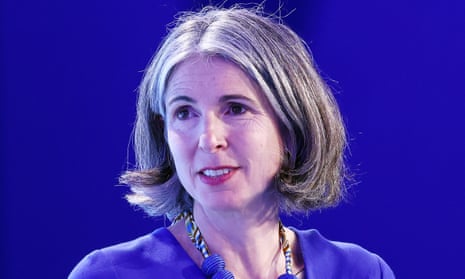Microsoft: 'The English Channel has never seemed wider'
Good morning, and welcome to our live coverage of business, economics and financial markets.
Microsoft has strongly criticised the UK and the Competition and Markets Authority (CMA), after the regulator on Wednesday blocked the US tech company’s $69bn (£55bn) takeover of games maker Activision Blizzard.
The US company came out swinging on Thursday morning.
The CMA’s move could scupper the entire deal for the maker of titles such as the Call of Duty first-person shooter franchise. Microsoft said that it made the EU seem more attractive for people to start businesses.
Brad Smith, a president at Microsoft, said in an interview on BBC radio’s Today programme:
We’re of course very disappointed about the CMA’s decision, but it’s more than that. Unfortunately I think it’s bad for Britain.
Activision Blizzard had already said that the deal made it appear that the UK was “closed for business”. The CMA argued that the deal would damage competition in the nascent cloud gaming market.
He made strong criticisms of the UK’s approach to regulation in comparison to the EU’s regulators, who are also examining the proposed takeover. He said:
For all of us who had some hope that the UK post-Brexit, that the UK would construct a structure that would even be more flexible, that would be better for investment, better for technology, we’re now finding that the opposite appears to be true.
I don’t think people are going to want to start a company in a country that will have regulators who will stop them from selling it to another company if the day arrives. There is a clear message here. The European Union is a more attractive place to start a business if you want someday to sell it than the United Kingdom.
The English Channel has never seemed wider in terms of Europe as a continent being attractive for investment, Brussels as a place where one can sit down and actually have a conversation with the regulators who are accountable to the elected leaders, and the difference we now confront in London, where we have regulators who are not only unelected, but unaccountable and now making decisions that just feel fundamentally unwise.
We will have more to come from Smith’s interview, and also the comments of the CMA this morning.
The agenda
10am BST: Eurozone economic sentiment (April; previous: 99.3 points; consensus: 99.9)
1:30pm BST: US GDP growth (first quarter; prev.: 2.6% annualised; consensus: 2%)
Key events
New boss of Confederation of British Industry to rename lobby group

The new boss of the crisis-stricken Confederation of British Industry has said she will rename the lobby group in an effort to show it is changing its culture following the Guardian’s revelations of allegations of serious sexual harassment.
Rain Newton-Smith, who was hurriedly appointed as the CBI’s new director-general this month to try to mend its reputation, must contend with an exodus of big businesses who have said they have already quit or suspended their membership.
Newton-Smith served as the CBI’s chief economist for nine years. She suggested that Britain’s biggest business lobby group – and previously its most influential – could be smaller in the future.
She spoke to the Financial Times and the BBC in interviews published on Thursday, after her first day in the job on Wednesday. To the FT, she said that the group would present proposals for the group to revive itself in June:
Personally, over time, I’m sure we’re going to see a new name for the CBI, but that’s just the wrapper that goes on the outside. What matters is what we do, what we deliver and our purpose.
The CBI that emerges from this is not going to be the CBI of the past, that is clear. It needs to be a new, a different organisation.
CMA: Microsoft/Activision Blizzard deal would have harmed competition

So what does the Competition and Markets Authority (CMA) say in response to Microsoft’s strident criticisms this morning?
Sarah Cardell, the CMA’s chief executive, said the decision to block the deal would be good for UK gamers and businesses. She also said there was “a lot of alignment” between the UK position and that of the US Federal Trade Commission, which is also considering whether to block the deal.
Speaking to BBC radio’s Today programme, Cardell said:
I really don’t agree with those comments at all. I think this decision shows how important it is to support competition in the UK, and that the UK is absolutely open for business. We want to create an environment where a whole host of different companies can compete effectively, can grow and innovate. That’s the best thing for UK consumers, and the best thing for UK businesses.
Cloud gaming – where games are streamed from central servers rather than played from expensive local devices – could change the shape of the games market, Cardell said. The regulator wants to see a market that is “really open for competition”.
That would not be the case if the merger went through, she said. Microsoft has a 60% to 70% share of cloud gaming, while Activision Blizzard has a strong portfolio of games.
What we found was that Microsoft already is the most powerful cloud gaming platform.
Combining those two businesses would really reinforce Microsoft’s strong position in cloud gaming. And that would be problematic because it would really harm the ability of other competing cloud platforms to compete effectively and offer the kind of innovation and product choice that we want to see in this market.
Addressing Microsoft’s allegation that the CMA went silent, Cardell said the company had “ample opportunity to put their case to us”.
Microsoft’s anger about the blocked Activision takeover is concentrated on the way that the Competition and Markets Authority (CMA) has handled itself.
In particular, the tech company’s president, Brad Smith, said the CMA had fallen silent in communications ahead of the announcement that it would not approve the takeover, and that it had not seemed willing to engage with the companies over how they could address the regulatory concerns.
Smith said:
The strong message the CMA has sent is not just to surprise everyone who fully expected this acquisition to be approved, but to send a message that I think will discourage innovation and investment in the United Kingdom.
The impact of this decision is far broader than on Microsoft or this acquisition alone. I think the impact on the UK unfortunately is to shake the confidence among the business community in the UK and the CMA as a regulatory agency. When we study the decision we feel in part it’s based on such a flawed or just faulty understanding of the market.
Smith said concerns about a combined company’s dominance of cloud gaming were too minor to scupper the whole deal. One interesting point he noted: Microsoft currently only has the ability to serve 5,000 cloud gamers in the UK at any one time. Cloud gaming requires a constant flow of data between central servers and gamers – which requires a huge amount of bandwidth.
I think it leaves people worried and it leaves people thinking, actually, the process in Brussels worked far better than what we’re now addressing in London.
This decision is probably the darkest day in our four decades in Britain. It does more to shake our confidence in the future of the opportunity to grow a tech business in Britain than we’ve ever confronted before.
Asked whether it will affect Microsoft’s investment decisions, Smith said: “It certainly will not help. It’s extremely disappointing and even frustrating.”
Microsoft also offered a 10-year undertaking not to limit games to its own platform.
Asked if he had a message to Prime Minister Rishi Sunak – who has cultivated something of a tech-friendly image – Smith said a rethink of the CMA’s role might be needed. He said:
I think that if the government of the United Kingdom wants to bring in investment, if it wants to create jobs and if it wants to make the United Kingdom a home where technology is not only going to flourish but be creative, then it needs to look hard at the role of the CMA, the regulatory structure, this transaction, and the message that the United Kingdom has sent to the world.
Microsoft: 'The English Channel has never seemed wider'
Good morning, and welcome to our live coverage of business, economics and financial markets.
Microsoft has strongly criticised the UK and the Competition and Markets Authority (CMA), after the regulator on Wednesday blocked the US tech company’s $69bn (£55bn) takeover of games maker Activision Blizzard.
The US company came out swinging on Thursday morning.
The CMA’s move could scupper the entire deal for the maker of titles such as the Call of Duty first-person shooter franchise. Microsoft said that it made the EU seem more attractive for people to start businesses.
Brad Smith, a president at Microsoft, said in an interview on BBC radio’s Today programme:
We’re of course very disappointed about the CMA’s decision, but it’s more than that. Unfortunately I think it’s bad for Britain.
Activision Blizzard had already said that the deal made it appear that the UK was “closed for business”. The CMA argued that the deal would damage competition in the nascent cloud gaming market.
He made strong criticisms of the UK’s approach to regulation in comparison to the EU’s regulators, who are also examining the proposed takeover. He said:
For all of us who had some hope that the UK post-Brexit, that the UK would construct a structure that would even be more flexible, that would be better for investment, better for technology, we’re now finding that the opposite appears to be true.
I don’t think people are going to want to start a company in a country that will have regulators who will stop them from selling it to another company if the day arrives. There is a clear message here. The European Union is a more attractive place to start a business if you want someday to sell it than the United Kingdom.
The English Channel has never seemed wider in terms of Europe as a continent being attractive for investment, Brussels as a place where one can sit down and actually have a conversation with the regulators who are accountable to the elected leaders, and the difference we now confront in London, where we have regulators who are not only unelected, but unaccountable and now making decisions that just feel fundamentally unwise.
We will have more to come from Smith’s interview, and also the comments of the CMA this morning.
The agenda
10am BST: Eurozone economic sentiment (April; previous: 99.3 points; consensus: 99.9)
1:30pm BST: US GDP growth (first quarter; prev.: 2.6% annualised; consensus: 2%)

 1 year ago
149
1 year ago
149










 English (US)
English (US)